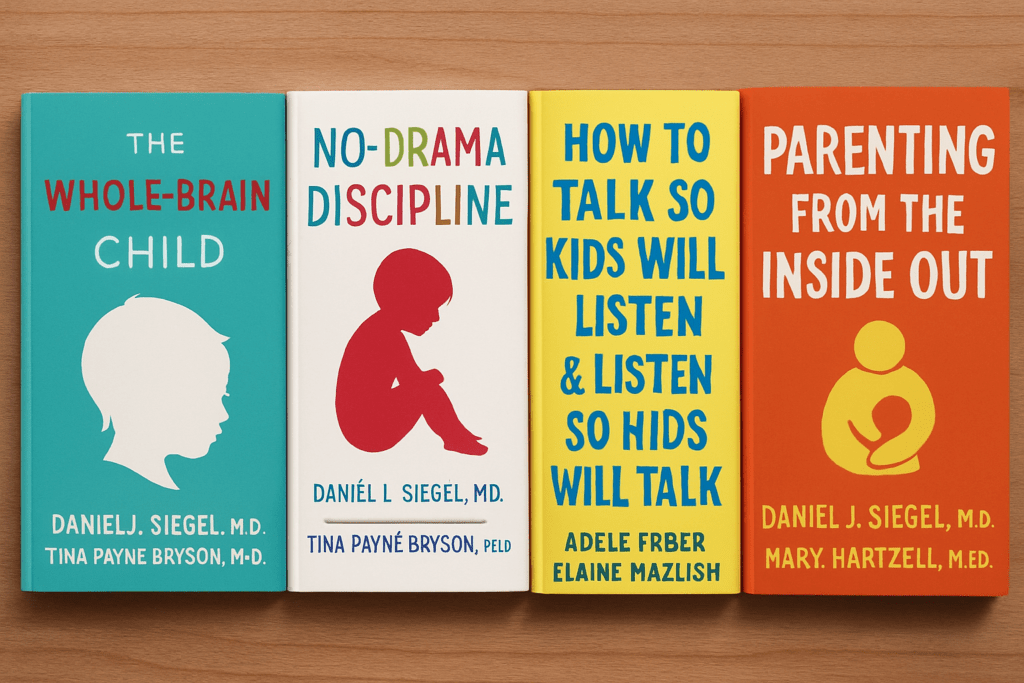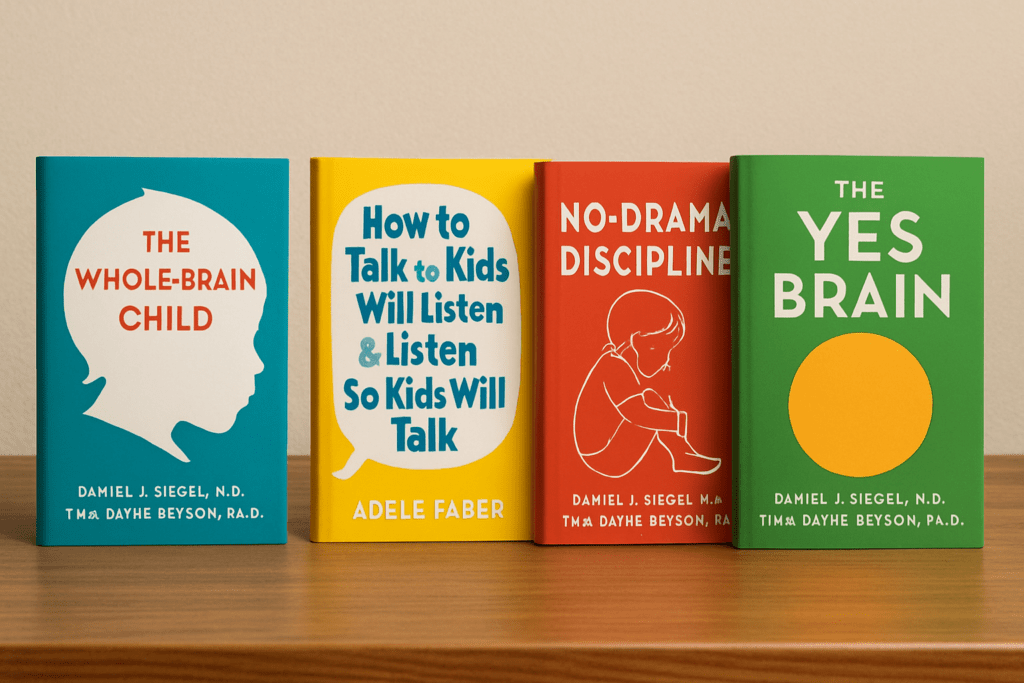Must-Read Parenting Books for Every Stage
- No one gets a manual when they become a parent, but some books come close.
- Whether you’ve got a newborn, tween, or teenager, the right read can help get you through.
- We’ve combed through top lists and parent favorites to build this short but solid guide to parenting books for every age and challenge.
Must-Read Parenting Books for Every Stage
No one hands you an instruction manual at the hospital, but some books get pretty close. That’s why we put together a fast, no-nonsense roundup—call it a cheat sheet—for parenting reads that actually deliver. Got a newborn who won’t sleep? A tween testing the limits? Teenager rolling their eyes into next week? There’s a book for that.
Here’s the deal: we did the digging through bestseller lists, mom-group debates, and expert favorites to offer up a handful of books—one or two for each stage. You don’t need an entire shelf, just the right title at the right time. Tuck one by your pillow (or download it to read in the pickup line): you might just find a line or two that keeps you sane through the next meltdown.
Why Parenting Books Still Matter
Let’s be straight: you’ll get a million tips from relatives, blogs, and “experts” at the playground. Trends come and go—one year it’s all about time-outs, next it’s “gentle parenting” or bust. But what doesn’t change is the tangle that comes with raising actual, real-life kids, not theoretical ones. This is where good parenting books earn their keep.
Parenting books aren’t just collections of rules or recipes. The best ones lay out the science in plain language, mix in real stories, and—most importantly—remind us we’re not crazy for feeling like we have no idea what we’re doing. They give you frameworks, not just hacks; perspective, not just panic. When you’re up at 2 a.m. questioning everything, or staring down your angry nine-year-old wondering how you got here, that reliable, dog-eared book can be the extra pair of shoulders you lean on. Sometimes, a chapter or two is all it takes to power through.
Bottom line? Parenting is a lifelong experiment, and books are among the best field guides we have.
Early Years: Nurturing the Newborn and Toddler
Let’s be honest: the first years are chaos, and the stakes feel sky-high. In between late-night feedings and panic-Googling “is green poop normal,” you just want straightforward advice that actually works. The best parenting books for early childhood don’t drown you in theory or guilt. Instead, they keep it short, practical, and rooted in science.
Look for books that calm your nerves about sleep (because no, your baby isn’t broken), demystify feeding, and talk you through those mind-blowing first milestones. Harvey Karp’s “The Happiest Baby on the Block” is a perennial favorite for good reason: it breaks baby soothing down into manageable bites. For a different spin, “Bringing Up Bébé” by Pamela Druckerman offers you a peek at French parenting—less stress, more structure.
Bottom line? In the newborn and toddler trenches, you’re not looking for perfect—just a little less guesswork and a lot more confidence. The right book can help with both.
The Middle Years: Raising School-Age Kids
School-age. This is where parenting gets a little trickier—and a lot more interesting. Your kids start building friendships, opinions, and a streak of independence that’ll test your patience and imagination. These are the years when simple instructions stop working and you need communication and consistency more than ever.
Look for books that skip the lectures and get straight to the point. “How to Talk So Kids Will Listen & Listen So Kids Will Talk” delivers gritty, usable advice for cutting through arguments and actually connecting with your child. If you’re after science with real-life strategies, “The Whole-Brain Child” breaks down complicated brain facts into things you can actually do—like handling meltdowns or boosting resilience.
Bottom line: This stage is about guiding, not controlling. The best reads won’t just tell you what to say; they’ll teach you how to listen, set boundaries, and let your kid’s personality shine, messiness and all.
Please let me know if you would like any other type of editing or additional information.
Winning Millions: The Aftermath
Winning a life-changing lottery jackpot is every player’s dream, but few are prepared for what happens next. The sudden influx of wealth brings excitement, but also a host of challenges. Here's a breakdown of what often follows:
The Financial Reality
Many winners face critical financial decisions almost immediately:
-
Taxes and Legal Issues
- A large chunk of the winnings often goes to taxes, and failing to plan can lead to serious legal troubles.
-
Investing vs. Spending
- Some winners hire financial advisors to ensure long-term security, while others may spend impulsively without a strategy in place.
-
Budgeting for the Future
- Without proper money management, even the biggest jackpots can quickly disappear.
Lifestyle Overhaul
A sudden fortune changes life in more than one way:
-
Luxury Purchases
- Mansions, sports cars, and extravagant vacations become instantly affordable and alluring.
-
Social Pressure
- Long-lost friends and distant relatives often reappear, expecting a share of the winnings.
-
Privacy Challenges
- Some winners struggle with unwanted media attention and public scrutiny.
While some winners embrace their new wealth openly, others choose to live discreetly to avoid pressure and expectations.
Giving Back and Creating a Legacy
For some, wealth is not just about personal luxury—it’s an opportunity to make a difference. Many winners choose to:
-
Donate to Charities and Community Projects
- Making financial contributions to causes they are passionate about.
-
Fund Scholarships or Support Educational Initiatives
- Investing in future generations by supporting education.
-
Invest in Businesses
- Creating jobs and opportunities by supporting local enterprises.
Some lottery winners transition from being players to philanthropists, proving that wealth can be used to leave a lasting impact. However, not all stories end positively—those who fail to manage their winnings properly often find themselves bankrupt within years.
Award-Winning and Crowd-Recommended Reads
You don’t need to reinvent the wheel—or raise your kid with just gut feelings and caffeine. Some parenting books have won serious accolades, hit bestseller lists, and sparked online fan clubs for good reason. These are the books that keep popping up in your group chat, on expert panels, and in late-night searches from desperate parents everywhere. If you want tried-and-true guidance, start with titles that have both expert stamps and thousands of five-star reviews backing them up.
Why do these books get so much love? Usually, it’s a mix of sharp insight, practicality, and an ability to make you feel like you’re not alone on the tougher days. Some cut straight to the chase, while others offer the kind of deep understanding you need when things get complicated. If you gravitate toward what everyone’s talking about, check out the annual honorees—think National Parenting Product awards or “best of” lists from big parenting organizations. And when you want advice straight from the trenches, browse what fellow parents are raving about: Goodreads and Amazon have endless lists, sorted by age, issue, or just plain popularity.
Bottom line: The award-winners and crowd favorites became popular for a reason. Even if you only have time to skim one, you might just find the nugget that gets you through the next stage.
Final Thoughts
There’s no map for raising kids, but the right book can feel like finding a trail marker in the woods. Every family, every child—each story is different, and a single title won’t suit all. That’s part of the work and the reward. The books on this list aren’t silver bullets, but they’re packed with insight that can nudge you through late-night questions and big crossroads. Skim a few chapters, dog-ear a page, borrow a new perspective. Parenting isn’t about being perfect—it’s about showing up, day after day, and sometimes getting a little help along the way. Take what makes sense, leave what doesn’t, and know you’re not in it alone.


 Founder & Chief Editor
Founder & Chief Editor
